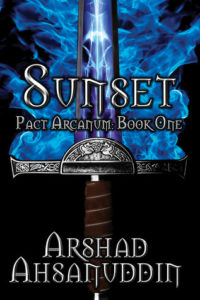
My judging team in the third annual Self-Published Science Fiction Competition (SPSFC3) has turned in our two semifinalists, and in return, we’ve received two semifinalists each from a pair of other teams. Our task over the months of February and March is to read these four new semifinalists, and together with the other two teams, select two finalists from our set of six. And in an attempt to balance out my long reads with my short ones, my second attempt of the round was Sunset by Arshad Ahsanuddin.
The reviewer who sent Sunset through to the second round billed it as Underworld set in the 2040s with the vampires being more than a bit gay. As someone who doesn’t regularly dip into either urban fantasy or romance, that was always going to be a little bit outside of my comfort zone, but it led with a quality hook: an uneasy alliance between three organizations of supernatural beings are thrust into the public eye when they stop a terrorist attack in Los Angeles. Now exposed, they have to not only maintain the armistice with each other, but also prevent war with ordinary humanity.
Like I said, it’s a fascinating hook, and the opening chapters sold it wonderfully. I went from deeply skeptical to totally onboard in a pretty short span. Unfortunately, the story got significantly muddied from there, having the feeling of a debut novel that worked hard to nail the opening but wasn’t quite sure how to sort through myriad ideas to create a cohesive novel.
Because after the opener, we have plenty of backstory for how the vampire lead came into his current position, including—but not limited to—at least two romantic subplots and a bout of unrequited love. And then there’s a mentorship subplot in the main storyline that brings another romantic subplot. And there’s plenty of internal politics in the supernatural world. And a few visits to the supernatural space program. And that’s all in addition to the main diplomacy plot, which has a tendency to get lost in the shuffle.
To be honest, it’s enough content for a series, but it’s too much for one book. And the way the narrative jumps from subplot to subplot doesn’t do it any favors from a cohesion standpoint. The flashbacks tend to come shortly after the reader learns the results of the events being told in the flashback, giving them enough context to lose any sense of mystery, but not enough context to really make an emotional impact. And the proliferation of characters and storylines tends to leave major players sidelined for years in the in-story chronology, returning with character development that occurred almost entirely off the page. I don’t want to criticize the romance too hard, because I’m not exactly a romance connoisseur, but I can’t help but feel the attempt to create so many different connections prevented any individual couple from really standing out.
If it feels like I’m spending a lot of time complaining about this book, that’s probably true. But that’s not because there’s nothing worthwhile so much as it is a few structural decisions overshadowing the truly compelling aspects of the story. If there’s no hook, or there’s a wooden prose style that makes immersion impossible, it’s easy to dismiss a book in a paragraph. But Sunset has a really compelling main idea, and the quality of the opening proves that the author has the writing chops to bring the story to life. But bringing the story to life requires some judicious decisions about which storylines to spotlight and which to cut, and the structure of Sunset muddied things more than it vivified them. There’s something here, but it’s buried behind a book trying to do too much too soon.
Can I use it for Bingo? It’s Self-Published.
Overall rating: 9 of Tar Vol’s 20. Two stars on Goodreads.
SPSFC score: 4.5/10 for my personal score. The official team score will be determined in concert with my teammates.
